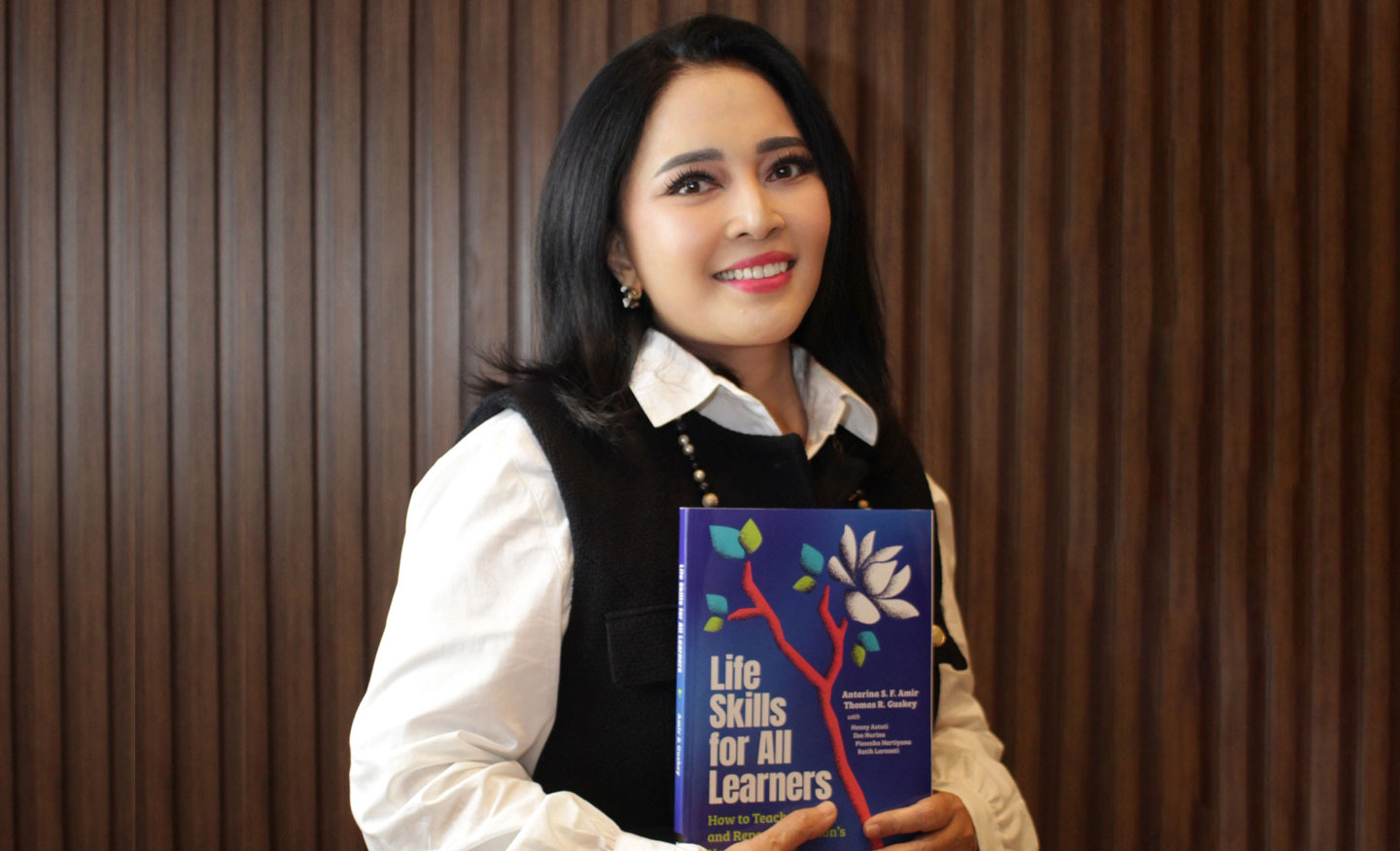“Life Skills for All Learners” – Antarina Advocates for Liberating and Competitive Education

Are we confident that schools have truly equipped our students with the knowledge and skills they need for their future?
National Education Day is a critical moment to reflect on the direction of education in Indonesia. In today’s era of globalization and digitalization, soft skills—or life skills—such as critical thinking, communication, collaboration, creativity, and problem-solving are, in fact, the keys for students to face future challenges.
In her book “Life Skills for All Learners: How to Teach, Asses, and Report Education’s New Essential” published by ASCD in the United States, Antarina SF Amir—granddaughter of Ki Hadjar Dewantara and an education expert—highlights eight essential pillars of life skills that need to be developed through the learning process, starting from early childhood education (PAUD) up to secondary education (elementary, junior high, and senior high school).
The book, co-authored by Antarina SF Amir, Thomas R. Guskey, and the Redea Institute team, discusses these eight fundamental life skills: Meta Level Reflection, Expert Thinking, Creativity and Innovation, Adaptability and Agility, Audience Center Communication, Synergistic Collaboration, Emphatic Social Skills, serta Ethical Leadership.
“A strong foundation of education must be laid from early childhood to high school. This includes developing critical and creative thinking, communication, and collaboration,” Antarina emphasized. She has spoken at international education conferences in Hong Kong and New York to present her work.
These fundamental skills, she added, provide the basis for students to learn independently, collaborate with others, and understand and process information across disciplines.
She also explained that Gen Z, often considered digital natives, is sometimes assumed to be technologically literate. “However, the lack of Meta-Level Reflection and Expert Thinking can actually hinder their digital literacy,” she said.
“Digital literacy is not just about being able to use devices and applications, but also about evaluating information critically, understanding the ethical implications of technology, and using technology responsibly and productively,” Antarina noted.
Without strong Meta-Level Reflection and Expert Thinking, Gen Z may risk becoming passive technology consumers, easily influenced by disinformation, and less capable of leveraging technology for innovation and problem-solving.
Antarina stressed that education must focus on developing skills that are relevant to today’s world. “Life skills are not only about technical abilities but also about soft skills that are vital in social interaction,” she said.
She added, “We need to equip students with the ability to adapt and innovate in the face of ever-changing challenges.”
Building Competence and Value-Based Character Education
Beyond skills and competencies, Antarina SF Amir also emphasized the importance of developing empathic social skills and ethical leadership in today’s interconnected and complex world.
Empathic social skills enable individuals to understand and feel others’ perspectives, build positive relationships, and contribute constructively to society.
Meanwhile, ethical leadership equips individuals to lead with integrity, responsibility, and morality.
“Education must shape individuals who are not only intellectually capable but also socially and morally sensitive,” she stressed. This is particularly relevant to global challenges such as disinformation, intolerance, and humanitarian crises.
“Character education is about forming individuals who not only possess knowledge but also strong values. When we teach character, we are not only shaping individuals but also building a better society,” she said.
Antarina emphasized that character education is not confined to a specific subject but can be integrated across the curriculum and into all school activities.
She gave examples of how strengthening character and values can be done through extracurricular activities, collaborative projects, and daily interactions at school.
“For instance, during mealtimes with children, that activity can be used to instill character, values, social norms, and environmental awareness,” she explained.
Thus, character education becomes an integral part of the learning process without being restricted to specific subjects. This approach enables students to internalize values through real-life experiences and positive social interactions.
Ki Hadjar Dewantara’s Philosophy to Build an Excellent Generation
Interestingly, in her book—which has received positive responses both locally and internationally—Antarina explores one of Ki Hadjar Dewantara’s deeply relevant educational philosophies known as Niteni (observe), Nirokke (imitate), and Nambahi (develop).
She explained that Ki Hadjar Dewantara’s 3N philosophy represents a dynamic and continuous learning process.
Niteni emphasizes the importance of careful observation of the surrounding environment. Nirokke shows that imitating or learning from good examples is part of the learning process. Most importantly, Nambahi invites learners not only to imitate but also to improve, add, and create something new.
“This philosophy highlights that education is not merely about transferring knowledge but also about fostering creativity, innovation, and critical thinking,” she said. Students are expected not only to absorb information but also to process it, develop it, and create new knowledge.
She believes the 3N philosophy is highly relevant in today’s world, where the ability to observe, learn from examples, and innovate is increasingly essential amid the flood of information and rapid change.
On the other hand, Antarina acknowledged that the journey toward ideal education is not easy. However, she sees progress and growing awareness among education stakeholders.
“What matters most is that the intention and awareness are heading in the right direction,” she concluded, stressing the importance of goodwill and continuous effort.